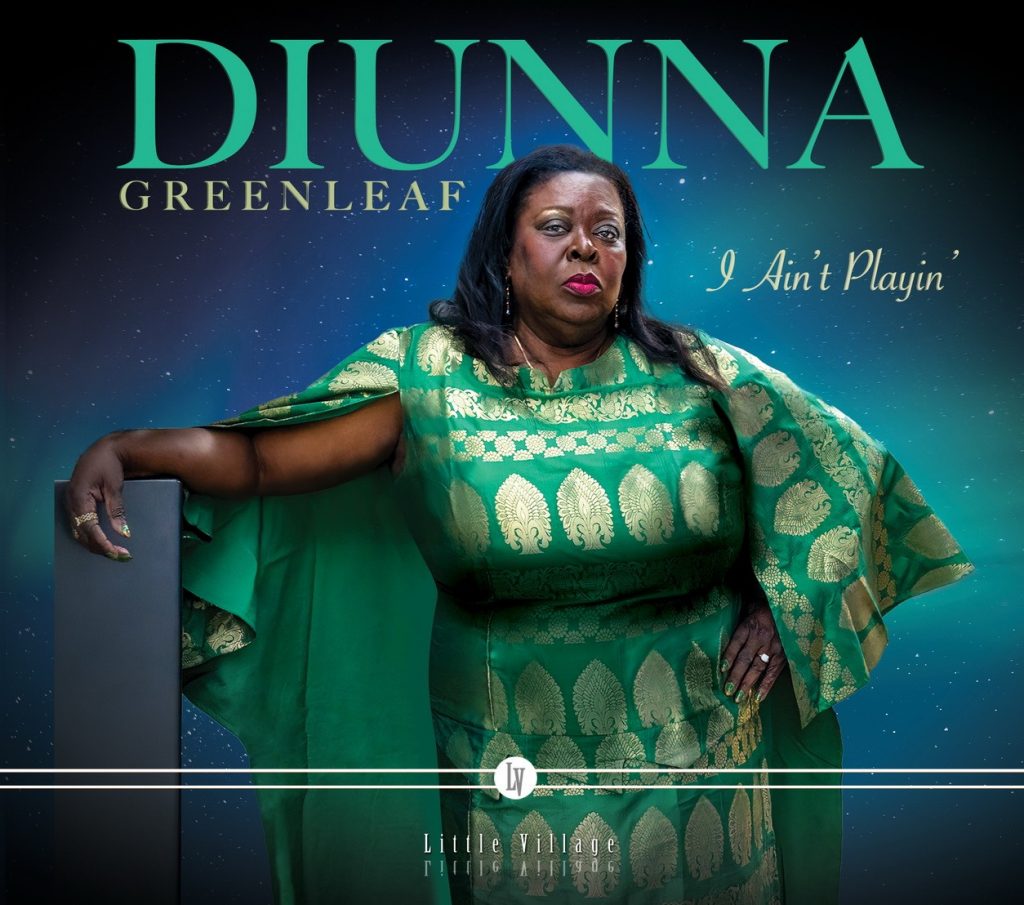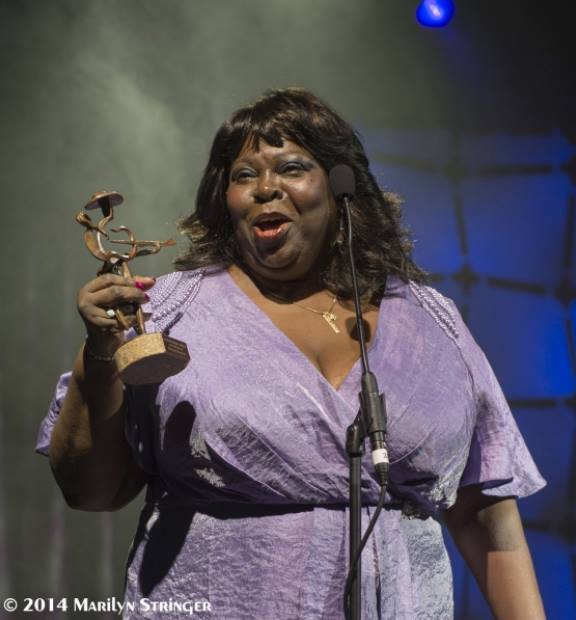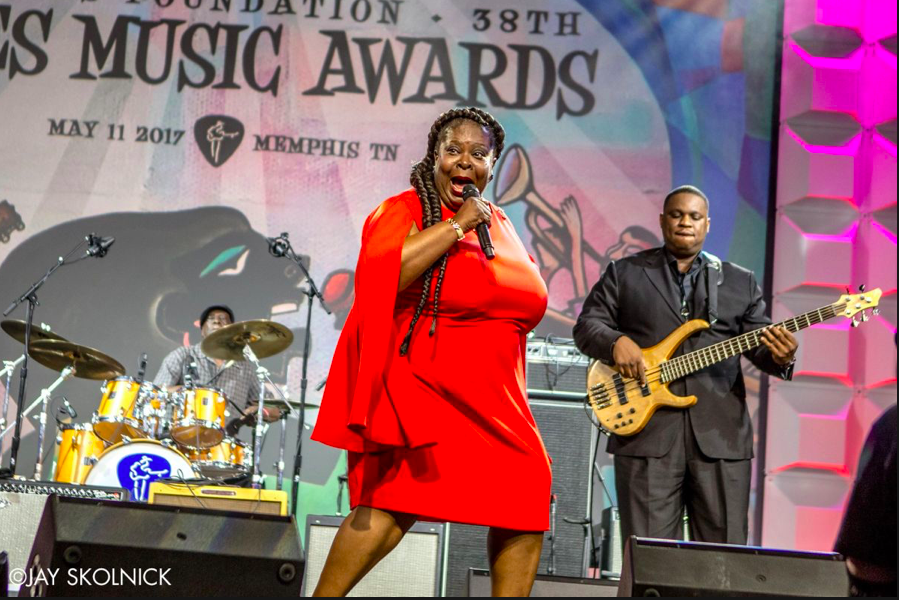The people behind Diunna Greenleaf’s I Ain’t Playin’ on Little Village Records have the skill to show this lady off for what she is, one of an exceedingly rare breed of blues shouter. Her style is matched by a sophistication born out of a life hard fought and well lived. Her combination of raw energy tempered by wisdom may outwardly seem an oxymoron in a blues tradition that harkens back to the raw declarations of Bessie Smith.
It’s not.
This woman is the real deal.

And the talents of label founder Jim Pugh, producer Kid Anderson, executive producer Noel Hayes and the many guest artists backing her up have set the bar height. It’s all in the name: I Ain’t Playin’ indeed.
I Ain’t Playin’ is on Little Village, the label owned by Jim Pugh, best known for his keyboard work with Robert Cray. Pugh describes the artists on his label as “musicians on the outside looking in. These are all artists that for different reasons have been marginalized by our society. There is no way that any of these musicians were going to get a record deal.”
Diunna could be a poster child for the label.
“I’m trying to put out fires in every area of my life,” says 65-year-old Diunna in a 5 a.m. phone call from her home in Houston, Texas. “I’m gonna tell you straight and do with it what you wish. When I meet atheists and I say, ‘God is watching me, an angel, they think I’m deluded.’ I’m supposed to be held back because I’m a black woman singing blues in a genre of music that was created by my people? I don’t think so.
“I’m not trying to bomb shell this new release or anything. I’ve watched them (agents) take on people who are my former students, people that I have helped bring to the Blues Foundation and things like that, but just to be a little bit of a snub to me. One told me I’m a frenemy. I said what? He says, ‘You are what we consider a frenemy. If you are on the stage, that means one of our artists is not on the stage.’ I think he’s regretted that line, but it is what it is.
“And I more and more understand how easy it was for daddy and his brothers to walk away from the industry. But no regrets. They had a meeting at the kitchen table. This how it was told to us, and they decided they could continue doing what they started was singing for the Lord.”
Her new album covers songs by Koko Taylor, Deitra Farr, and Johnny Copeland. She does four originals including “Back Door Man” (not the Howlin’ Wolf song of the same name) where she tells her two-timing man what for: “You gotta get out of my house, and leave the keys to my car. That’s my Mercedes you been driving.”
“We just sort of played songs for each other,” says Jim Pugh about the Greaseland recording session. “She made suggestions. We made suggestions. Noel Hayes, the executive producer, was the one who started doing her in the first place. He brought her.
“We sat around in a room and played for each other and came together with ideas. The studio is in a two-bedroom ranch house that’s been completely overtaken with instruments. keyboards and guitars, and there’s not a place to sit. I have to be careful not to knock right over.
I Ain’t Playin’ Producer Kid Andersen owns Greaseland Studios where this record was made. He was Charlie Musselwhite’s lead guitarist on the Blues Award-winning album Delta Hardware. His studio has released more than 50 albums by Rick Estrin & The Nightcats, Tommy Castro, Wee Willie Walker and many others.
“Kid Andersen does about half the records I do,” says Pugh, who played keyboards for Robert Cray for 25 years and with Etta James before that. “It’s really nice to have somebody where I don’t have to pay attention to what’s going on on the technical end because I know it’s being captured in a way that I agree with, and so it comes down to a very relaxed but not sleepy environment where there’s a minimal amount of headphones.”
In concert Diunna Greenleaf’s angst explodes in a catharsis so powerful, it hits you in the face, a hurricane wind that transports you to a world that exorcises your exhaustion, lifting you into Nirvana. Buddy Guy has it. The Queen of the Blues Koko Taylor had it, and her friend Diunna has inherited it from Koko. She sings Koko’s “I Wish I knew How It Would Feel to Be Free” on this career-defining new album.
“I don’t think Koko knew how sweet she was,” says Diunna about her friend “She’d say, ‘How come you never call me.’ I said, ‘Well, I didn’t want to bother you.’
‘If I didn’t want you to call, I wouldn’t have given you the number,” Koko told her. “You don’t bother me. When you call, if I can’t talk, I tell you I can’t talk.’
Koko once told movie star Steven Seagal, “I want to introduce you to Diunn.” That’s what Koko called her friend. “I mean this lady can sing. And you need to find a place for her in one of your movies, so she (can) break away from those people who don’t want her to do stuff.’”
“We all sat there which is not the traditional way to do that,” says Pugh about the recording sessions. “They usually separate the vocalist or separate the drums. So, we were in the room together, and he (Kid Andersen) has a natural way of capturing (us), and there was an attractive level of fidelity that might not otherwise be possible, but it’s spectacular.
“D’mar (Derrick “D’mar” Martin) played drums for 25 years with Little Richard. So, everybody was capable of being musical pretty quick. We didn’t have to play things 10 times. So, it’s kind of fresh sounding, don’t you think?”
Diunna is not quite so sure. “They’d say, ‘Diunna, this album is the bomb.’ And I’d say I wish we’d cleaned up this part or that part. (Bass player) Jerry Jemmott was there, somebody I’d wanted to meet forever since I was a teenager. We used to hear him on stuff with Aretha Franklin. He said, ‘If you change anything on there, I’ll break both your legs.’ Jerry Jemmott was arranger and bass player for Nina Simone, King Curtis, and B.B. too, and I knew most of his work with Aretha.”
In some ways Diunna is a reluctant blues diva. She didn’t get into the game professionally until she was 36 years old, but music has been in her life since she was a child. “Johnny Taylor used to come by all the time at night. He’d be at my house about the same time now (5 a.m.) After coming to my house my mommy and daddy might have still been there, but we kids were going to bed. We had to get up and help mama cook just like we were having dinner or something like that you know, but me and daddy and them we would talk and there’d be singin’. We’d hear them singing, and we’d get up and listen to ’em. But anyway, I said all that to say this.”

She earned an undergraduate degree in mass communications, a master’s degree in educational counseling, has worked as a counselor, and spent 20 years as an officer in the Army, the last of her three MOS’s (job category) earned after going to a special school on the locking down of heavy equipment on C130s.
“Blues women, black or white, have had to handle things that other people don’t ever think about,” she says, looking back. “The reason I couldn’t get everywhere in music is because they told me I needed to have one of the men in my band handle the business. And they weren’t lying. So, I said, ‘Thank you, bye.’
“In all my life, on most of my jobs I’d be the only woman. Not only the only woman, the only black sometimes. When I was in the Army, there were three women in the 75th when I went there. Now, others came later, ok? I’m talking about things that did happen with some of the women that quickly leave, but they caught them in the lunch break in somebody’s car with their head bopping up and down in their laps. None of those things with me, ok? The men in my section showed great respect for me because it’s so hard work.”
The new album opens with “Never Trust A Man” first sing by Koko Taylor on her From The Heart of A Woman album: “Mama told me girl you just can’t trust any man, but I was wild at the time and just didn’t understand.” It features Producer Kid Andersen on lead guitar and Jim Pugh on keyboards. It’s a big production that never gets in Diunna’s way. Like most of the songs, it has one foot in the Chess tradition and one foot in a contemporary mode. “I know there are good men in the world that you can count on one hand and I’m trying to tell all your girls. I hope you understand.”
“I Know I’ve Been Changed” is a traditional gospel song done by The Staples Singers: “The angels in heaven done signed my name/I know I’ve been changed…Healed my body but not my soul.”
My favorite cut is “Let Me Cry,” an obsessive love song by Johnny Copeland, Shemekia Copeland’s dad: “And if I’m a fool just let me be ’cause only his love can satisfy me / That’s why I love him and I will until the day I die.”
I Ain’t Playin’ ends with Diunna’s friend Deitra Farr’s declaration “My Turn, My Time.” This is classic soul announcing to the world that she’s coming on through.
Little Village defines itself as a 501c3 nonprofit record company that seeks to shine the light of awareness on musicians that might not otherwise be heard, and in doing so furthers the idea that a life filled with diverse music builds empathy making for stronger communities and a better world. All proceeds from sales of the albums are given back to the artists as a way to promote artist agency and ownership of their work. Recording an artist helps them connect to their community, while providing Little Village with an opportunity to share their music with the world and win the artist acclaim.
“I’ve only had to deal with (a perception that I’m an ignorant black woman) in the United States. Because of the fact I’ve had to do it all myself because I could not get an agent to bring me on their roster out of all the years I’ve tried. Since we’ve been in the pandemic, I have not wanted to get an agent, especially a blues agent, because they kind of circled the wagons on me, you know what I mean?”
Diunna’s history of dealing with agents is problematic. “Why would you charge me 20% when you charge most other people on your roster 10%? I was told ‘because I can get larger contracts for you.’ You know all these people I’m talking about, but I won’t name them right now.
“I said to Bob Margolin when I finally was able to speak after seeing George Floyd murdered. I knew him as George Terry, and I knew his mother, and I knew his brother. They lived right across the street from my house and office. I said, ‘Why are white people so afraid of black skin? What is it about this black skin?’”
It’s learned, I told Diunna.
“Yes, I know.”
I told Diunna that I have eight grandchildren. They’re not afraid of black people. The hatred is learned.
“But people fear what they don’t know, and that feeling that you gotta knock this person down to make yourself feel big. I’m just so damn tired.
“I’m just so damned tired.”
If paying your dues to play the blues were still the most important measure of success, Diunna Greenleaf would be a superstar. And if that superstardom rested in an artist’s latest release her crown would be secure.

